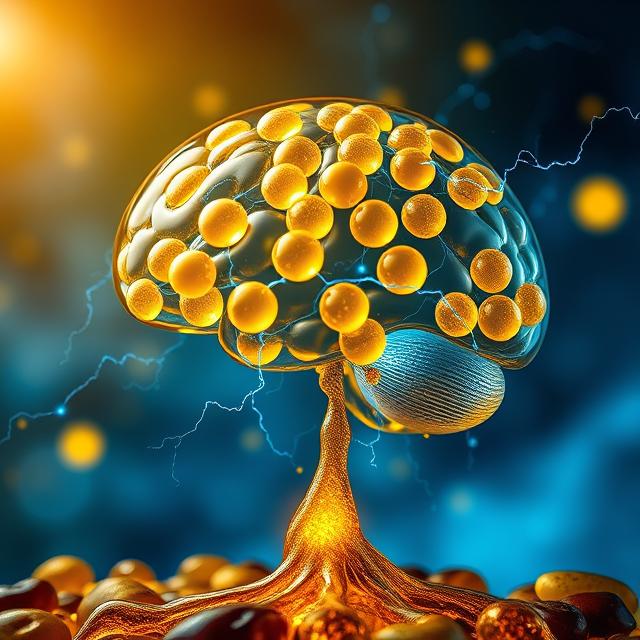
Table of Contents
The Science of Fat for Steady Cognitive Energy
In the search for sustained focus and clear thinking, one macronutrient stands apart from the sugar crashes and stimulant cycles of modern life: fat. Often misunderstood, fat is not just a backup fuel sourceâit is a foundational nutrient for long-term mental energy, stable mood, and cognitive resilience.
This article explores how dietary fat supports brain performance, what types of fats to prioritize, and how to time fat intake for optimal cognitive results.
ğ§ Why Fat Matters for Brain Function
The human brain is about 60% fat by dry weight. Neurons are sheathed in fatty membranes (myelin) that enable efficient electrical signaling. Every thought, every memory, every burst of focus depends on fats doing their job silently in the background.
Hereâs what fat does for your cognitive system:
- Structural integrity: Phospholipids, cholesterol, and omega-3s form the physical scaffolding of brain cells.
- Signal transmission: Fatty acids influence neurotransmitter sensitivity and receptor function.
- Hormonal balance: Fats help regulate cortisol, serotonin, and insulinâcritical players in mood and focus.
- Energy buffering: Fat is a slow-burning fuel that provides long-lasting energy without spikes or crashes.
Unlike carbohydrates, which provide quick but volatile energy, fats offer stable and extended fuel, ideal for deep focus and creative tasks.
𧬠How the Brain Uses Fat for Fuel
While glucose is the brainâs preferred quick-access fuel, fat becomes increasingly important in states of:
- Fasting or low-carb eating (fat-derived ketones fuel the brain)
- Sleep (where the brain relies more on fat metabolism)
- Extended focus (where glycogen stores wane and fat takes over)
Fat metabolism for cognitive energy happens in two main ways:
1. Ketogenesis (Fasting, Keto, or Low-Carb States)
When carbs are scarce, the liver breaks down fat into ketone bodies (like beta-hydroxybutyrate), which cross the blood-brain barrier and serve as a clean-burning fuel for neurons.
Ketones have been shown to improve mental clarity, reduce inflammation, and protect against cognitive decline (Veech et al., 2001).
2. Postprandial Fat Metabolism (After Meals)
Even in a mixed diet, fats help modulate digestion speed and blood sugar stability. Eating fat alongside carbs slows glucose release, which helps reduce mental fog and mood swings.
𧪠What Science Says About Fat and Cognitive Performance
Recent studies suggest that moderate-to-high fat intakeâespecially from unsaturated and omega-3 sourcesâis associated with:
- Improved memory
DHA (docosahexaenoic acid), a major omega-3, supports synaptic plasticity and memory formation. - Reduced anxiety and depression
Omega-3 supplementation has shown positive effects on mood and executive function. - Longer attention span
Fat-rich diets correlate with improved sustained attention, particularly in fasting states. - Neuroprotection
Fats shield the brain from oxidative stress, especially during aging or intense mental workloads.
A 2021 review in Nutrients emphasized that fat qualityânot just quantityâplays a crucial role in cognitive aging and neuroplasticity.
ğ¥ Best Fats for Mental Energy
Not all fats are created equal. Here’s how to prioritize fats that feed your brain:
ğ¢ Healthy Unsaturated Fats (Preferred)
- Monounsaturated fats: Olive oil, avocado, macadamia nuts
- Omega-3 fatty acids: Fatty fish (salmon, sardines), flaxseed, walnuts
These fats reduce inflammation and enhance neurogenesis (the birth of new neurons).
ğ¡ Saturated Fats (Contextual)
- Coconut oil, ghee, and pasture-raised butter
These medium-chain triglycerides (MCTs) convert rapidly to ketonesâgreat for quick cognitive boosts.
Saturated fats are not inherently bad, but balance matters. Excess without sufficient metabolic demand (e.g., sedentary lifestyle) may impair vascular health.
ğ´ Avoid: Processed Trans Fats
- Found in margarine, fried foods, or baked goods
- Associated with cognitive decline, inflammation, and insulin resistance
â± Fat Timing for Focus: When to Eat for Mental Clarity
Morning (Pre-Study or Work Session)
A fat-forward breakfastâlike eggs with avocado or a smoothie with MCT oilâhelps stabilize blood sugar and set a calm, focused tone for the day.
Avoid sugar-heavy breakfasts that lead to insulin spikes and mid-morning brain fog.
Midday (Focus Maintenance)
A light fat-inclusive meal keeps energy smooth through the afternoon. Add olive oil, seeds, or fatty fish to your lunch for sustained cognition.
Evening
Keep fat intake moderate. Heavy meals late at night may impair sleep quality and overnight brain repair. If youâre fasting, a small fat-inclusive meal earlier in the evening works best.
𧪠Case Studies & Anecdotes
ğ¬ Case: Ketogenic Diet & Focus
Many people on ketogenic diets report “keto clarity”âa heightened sense of focus and low mental fatigue, especially during fasting windows. This is due to steady ketone levels fueling the brain without glucose fluctuations.
ğ§ Anecdote: Brain Fog & Low Fat Intake
Clients with very low-fat diets often report brain fog, fatigue, and irritabilityâespecially if paired with high-carb meals. Reintroducing healthy fats (like walnuts and sardines) often improves these symptoms within a week.
ğ¡ How to Start: Daily Fat-Focus Integration
| Meal | Fat Source | Brain Benefit |
|---|---|---|
| Breakfast | MCT oil, avocado, eggs | Kickstart focus with stable fuel |
| Snack | Walnuts, dark chocolate | Support mood & reduce cravings |
| Lunch | Salmon, olive oil, hummus | Sustained afternoon attention |
| Dinner | Moderate ghee or seeds | Avoid spikes & prep brain for rest |
ğ§ Final Thoughts: Fuel Your Brain the Right Way
In a world obsessed with quick energy, sugar highs, and over-caffeination, fat remains a misunderstood powerhouse. Whether youâre deep in study, problem-solving, or creative work, the science is clear:
Fat for cognitive energy isnât a trendâitâs a biological truth.
Feed your brain what itâs made of. Choose fats that stabilize your focus, balance your mood, and sustain your mental edge.
